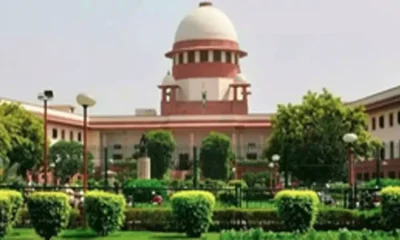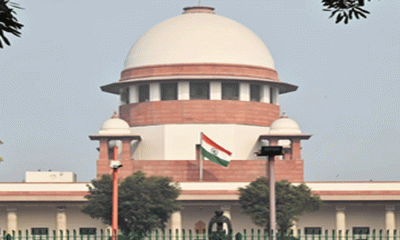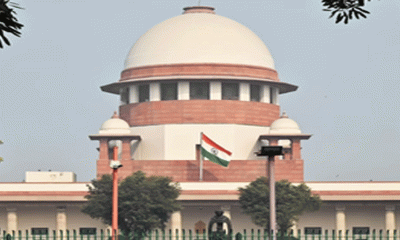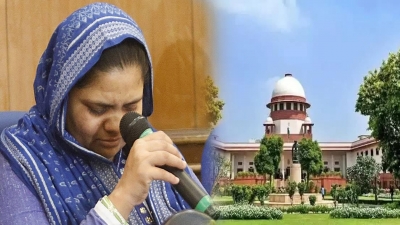National News
SC gives Centre two weeks to file affidavit on plea against Places of Worship Act

The Centre on Friday undertook before the Supreme Court that it will respond within two weeks on petitions challenging the validity of certain provisions of the Places of Worship (Special Provisions) Act, 1991.
In March last year, the apex court had sought Centre’s response on petitions challenging the provisions of the Act, but it is yet to file its response.
A three-judge bench, headed by Chief Justice Uday Umesh Lalit, specifically asked Solicitor General Tushar Mehta, representing the Centre, whether the Central government will file its response in the matter or not?
The bench, also comprising Justices S. Ravindra Bhat and P.S. Narasimha, noted that a notice was issued on the petition filed by advocate Ashwini Upadhyay long ago, and queried Mehta, has the Centre filed any response in the matter? Mehta said the government will file its response.
Advocate Vishnu Shankar Jain, representing a petitioner, submitted before the bench that the right of judicial review of the Act, cannot be taken away and relied on judgment in Minerva Mills.
BJP leader Subramanium Swamy, a petitioner in the matter, emphasized on reading down the Act so that along with Ram Janmabhoomi, the Kashi Vishwanath and Mathura matters can also be taken up.
Senior advocate Rakesh Dwivedi, representing a petitioner, said the question of reading down will arise only if it is found that the Act is not ultra vires of the Constitution.
After hearing submissions, the top court permitted all the applications, including the plea filed by Jamiat Ulama-i-Hind, to intervene in the hearing of the pleas challenging the validity of the Places of Worship (Special Provisions) Act, 1991, which prohibits the filing of a lawsuit to reclaim a place of worship or changing its character from what prevailed on August 15, 1947.
It noted that a bench of two judges of this court had issued notice in the matter in March 2021, thereafter this petition has been coming up on a few occasions. However, the Union of India has not put in any response, it added.
The bench said the matter be heard by a three-judge bench on October 11 and asked the parties to complete the pleadings before the hearing. It said the Solicitor General has been granted two weeks to file an affidavit.
On March 12, 2021, a bench headed by then Chief Justice S.A. Bobde had sought the Centre’s response on the plea filed by Upadhyay challenging the validity of certain provisions of the law.
Upadhyay’s plea said: “The 1991 Act was enacted in the garb of ‘Public order’, which is a State subject [Schedule-7, List-II, Entry-1] and ‘places of pilgrimages within India’ is also State subject [Schedule-7, List-II, Entry-7]. So, the Centre can’t enact the Law. Moreover, Article 13(2) prohibits the State to make law to take away fundamental rights but the 1991 Act takes away the rights of Hindus Jains Buddhist Sikhs to restore their ‘places of worship and pilgrimages’, destroyed by barbaric invaders.”
National News
‘No CNG, Double Rates!’: Fuel Supply Snag Throws Mumbai Commute Into Chaos; Fare Surge, Long Rides Denied To Travellers During Peak Morning Hours
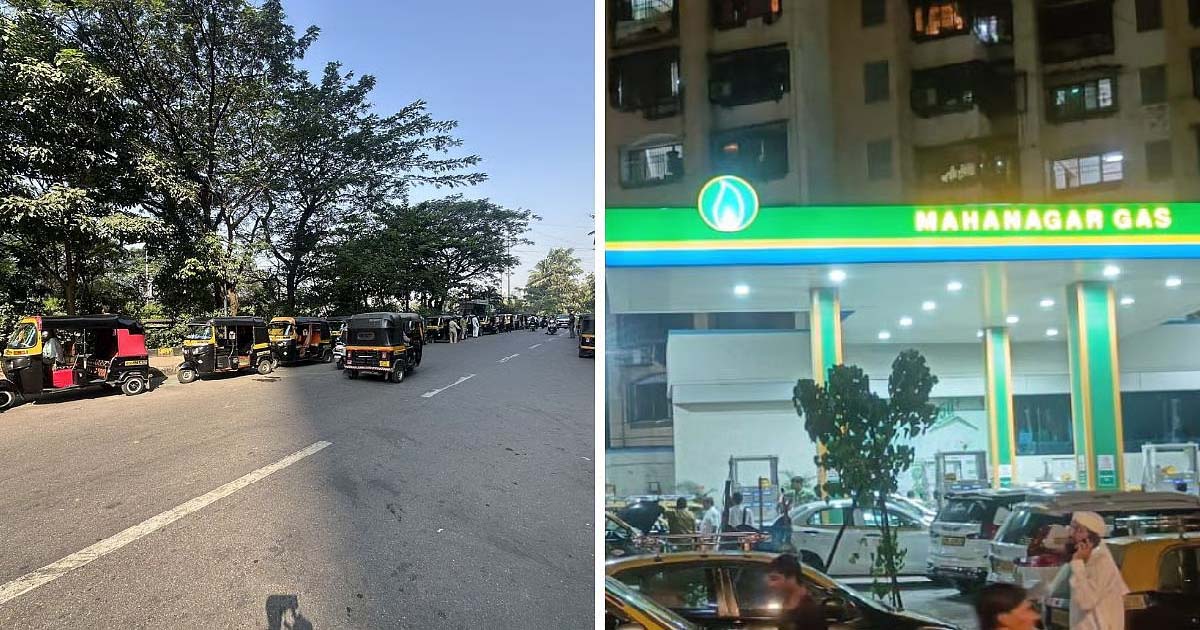
Mumbai: Mumbai woke up to severe commute disruption on Monday as a widespread CNG supply shortage left several fuel pumps across the city non-operational or functioning with limited output. The unexpected outage resulted in a sharp drop in the availability of autos, kaali-peeli taxis and app-based cabs, pushing commuters into long waits, inflated fares and overcrowded public-transport alternatives like trains and metros during peak office and school hours.
The shortage triggered a wave of commuter frustration online, with users posting videos, screenshots and complaints related to refusal of rides and steep fare demands. One user wrote, “No CNG double rates. Why don’t you declare public loot official? Daily fight, new challenge, struggle.”
Another commuter shared, “Autos in Mumbai charging 2x-3x the normal rate because of CNG shortage… as an office goer, you don’t have any option but to agree.” Parents too expressed helplessness, stating that limited transport availability had disrupted school drop-offs, labelling it “a manic Monday.”
A commuter informed Media that cab drivers have been charging Rs 500 from Andheri East to BKC this morning. The issue extended throughout all parts of MMR including Navi Mumbai, Mira-Bhayandar and Vasai-Virar. Ria Sharma, a commuter from Mira-Bhayandar said, “The CNG supply disruption has hit commuter movement sharply. There were no rickshaws in Mira Road to even reach the station. Many office-goers like me experienced long delays waiting for autos.”
The impact was visible as early as dawn, with hundreds of auto-rickshaws, taxis and aggregator vehicles lining up outside petrol pumps in multiple pockets of Mumbai, Thane and Navi Mumbai. Social media was flooded with visuals and eyewitness accounts showing kilometre-long queues snaking around petrol pumps, with adjoining roads clogged due to parked transport vehicles waiting for their turn to refuel. Many drivers claimed they had been waiting through the night or for several hours without clarity on when full supply would resume.
According to reports, the disruption was caused by damage to a gas pipeline inside the Rashtriya Chemicals and Fertilizers (RCF) plant premises, reportedly affecting GAIL’s main supply line and resulting in reduced gas flow to Mahanagar Gas Limited’s (MGL) City Gate Station at Wadala. The reduced pressure forced multiple CNG stations to temporarily halt or ration supply, impacting the city’s public-transport backbone that predominantly relies on CNG.
Mahanagar Gas Limited later confirmed that domestic piped natural gas (PNG) had been prioritised to ensure uninterrupted household supply, and stated that efforts were underway to gradually restore normal CNG distribution across its network.
National News
Mumbai: Uddhav-Raj, Thackeray Family Pay Tribute To Balasaheb Thackeray On His Death Anniversary At Shivaji Park
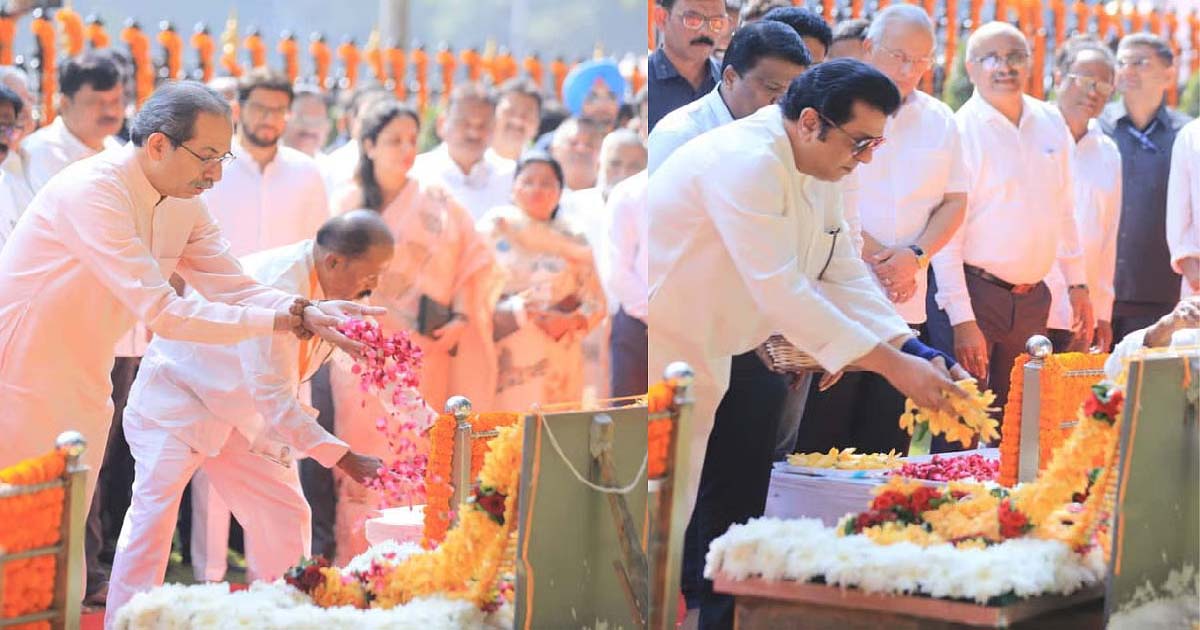
Mumbai: Shiv Sena (UBT) chief Uddhav Thackeray along with Maharashtra Navnirman Sena (MNS) Chief Raj Thackeray on November 17 paid tribute to Balasaheb Thackeray on his death anniversary at Dadar’s Shivaji Park. The Thackeray cousins were joined by Rashmi Thackeray, Aaditya Thackeray along with other party leaders at the memorial at Shiv Tirth and paid their humble respects. Shiv Sena founder Bal Thackeray died of cardiac arrest in the 2012 at the age of 86.
Balasaheb, often called the Hindu Hridaysamrat (Emperor of Hindu Hearts), passed away on this day in 2012, never held a constitutional post, yet commanded the city’s pulse through the sheer power of his oratory.
Earlier in the day, his son, Uddhav, also took to his social media handle on X (formerly Twitter) and wrote, “Sir, How much you have done for us! It is because of you that even today the backbone of ours stands tall. As long as the power named ‘Hindu Hrudaysamrat’ is with us, we have no fear of anything!”
Eknath Shinde, who was part of the united Shiv Sena, split from the party in 2022 and formed his own party with the same name following the principle of Balasaheb Thackery. Taking to his social media, the Maharashtra Deputy CM also paid tributes to Thackeray and said that his thoughts and memories ‘will forever remain in our hearts.’
Paying his tributes, NCP (SP) president Sharad Pawar said that Balasaheb unleashed a barrage of words on his opponents with his sharp Thackeray arrows and open-handed generosity.
“His satirical cartoons wounded many. Yet, throughout his life, he selflessly maintained friendships beyond politics without introducing any bitterness into them. Humble tribute on his remembrance day to the Shiv Sena chief, the late Balasaheb Thackeray, whose immense contributions to the state’s socio-political sphere make Maharashtra’s history incomplete without mention of him!,” he added.
Crime
Delhi Police arrest man, recover 16 stolen bicycles
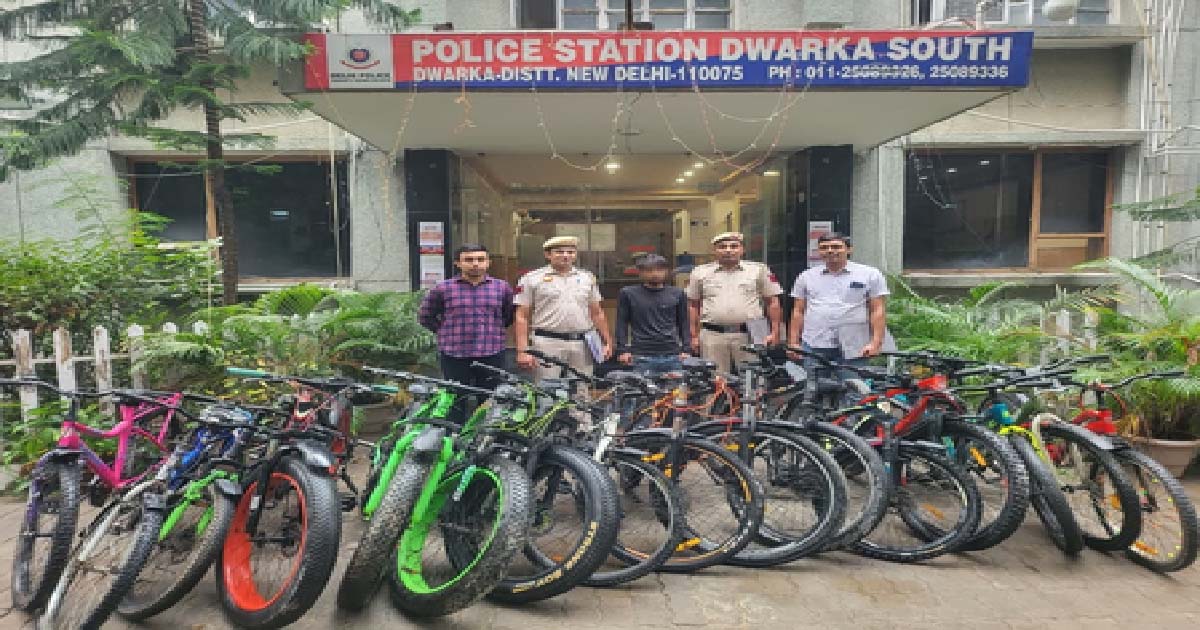
New Delhi, Nov 17: In a successful operation, a Delhi Police team arrested a bicycle thief and recovered 16 stolen bicycles, officials said on Monday.
During the investigation, more than 300 CCTV cameras from areas near the theft sites were examined, and local informers were activated. Both technical and manual intelligence inputs were collected to trace the culprits. The bicycle thief was previously involved in four criminal cases.
According to a statement released by the Dwarka South Police Station, the officers became more concerned after the recent rise in bicycle thefts in the Dwarka South area. Recognising that for many residents a bicycle is an essential possession, the police resolved to identify the offender and restore the stolen bicycles to their rightful owners.
A dedicated team was constituted by Inspector Rajesh Kumar Sah (SHO, Dwarka South), under the close supervision of ACP Dwarka, Kishor Kumar Rewala. The team included HC Sudhir Kumar (987/DW), HC Manoj Kumar (828/DW), HC Gaje Singh (1030/DW), HC Surender (764/DW), and Ct. Tushar Yadav (1803/DW).
On October 28, at around 7:00 p.m., HC Manoj received secret information that the thief would arrive near DDA Park or Bhains Wala Park within a few minutes. He immediately alerted the team, and the officers reached the location and laid a trap near Bhains Wala Park.
After some time, a man was spotted riding a bicycle from the direction of Ganpati Chowk towards Bhains Wala Park. His behaviour appeared suspicious, and the police signalled for him to stop. Instead of complying, he attempted to flee towards DDA Park, Dwarka Sector 7, abandoning the bicycle.
The team chased and apprehended him. Upon inspection, the bicycle matched the description of one reported stolen in e-FIR 80101951/2025, registered under Section 303(2) BNS at Dwarka South Police Station.
During interrogation, the accused confessed that he had stolen the bicycle from Ramphal Chowk Road, in front of Instyle Salon, Sector 7, Dwarka. He further revealed that he had stolen several other bicycles. Based on his disclosures, the police recovered 15 additional bicycles from different locations after sustained effort.
-

 Crime3 years ago
Crime3 years agoClass 10 student jumps to death in Jaipur
-

 Maharashtra1 year ago
Maharashtra1 year agoMumbai Local Train Update: Central Railway’s New Timetable Comes Into Effect; Check Full List Of Revised Timings & Stations
-

 Maharashtra1 year ago
Maharashtra1 year agoMumbai To Go Toll-Free Tonight! Maharashtra Govt Announces Complete Toll Waiver For Light Motor Vehicles At All 5 Entry Points Of City
-

 Maharashtra1 year ago
Maharashtra1 year agoFalse photo of Imtiaz Jaleel’s rally, exposing the fooling conspiracy
-

 National News1 year ago
National News1 year agoMinistry of Railways rolls out Special Drive 4.0 with focus on digitisation, cleanliness, inclusiveness and grievance redressal
-

 Maharashtra1 year ago
Maharashtra1 year agoMaharashtra Elections 2024: Mumbai Metro & BEST Services Extended Till Midnight On Voting Day
-

 National News1 year ago
National News1 year agoJ&K: 4 Jawans Killed, 28 Injured After Bus Carrying BSF Personnel For Poll Duty Falls Into Gorge In Budgam; Terrifying Visuals Surface
-

 Crime1 year ago
Crime1 year agoBaba Siddique Murder: Mumbai Police Unable To Get Lawrence Bishnoi Custody Due To Home Ministry Order, Says Report



